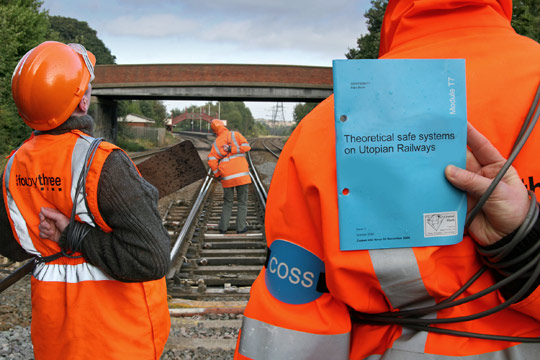Blissful ignorance strikes again
June and December are highlight months in my year. Nothing to do with the World Cup or impending ‘delights’ of Christmas. No, it’s that early-morning rattle of the letter box which signals the arrival of our biannual Rule Book changes. Without a thought for my health and safety, I hurtle downstairs to revel in their boundless comic pleasures. I understand Jack Dee writes them now.
So voluminous has our bible become that installing new modules in their ringbinder involves careful planning, not to mention a block and tackle. Manual handling techniques come to the fore. To blame for this burden are those priceless ‘throw some rules at it’ safety professionals. Don’t you just love them?
Every possible action is now governed…or so you might think. If it’s not explicitly sanctioned by the Rule Book then it must be prohibited. Right? That’s why nobody smiles when on or near the line, or plays strip poker. Trouble is, as any COSS will tell you, situations often arise on which the Rule Book is silent. Perhaps Jack Dee is ignorant of these issues or deems them too difficult to bother with. Either way, in the absence of guidance from a dry wit, it’s left to practitioners to fill in the holes.

Welding is a difficult job at the best of times - doing it ‘red zone’ heaps unhelpful issues into the mix. Frequent interruptions by approaching trains can impact on quality and makes the work significantly less productive. So ‘point watching’ by lookouts has become an accepted, if unofficial, means of moderating the pain. When no route is set through their site, group members stay put. Not perfect, just pragmatic.
With the scene set, let’s head to Tinsley Green Junction on the London-Brighton line, where a deteriorating crossing nose demanded urgent attention. At 0830 on 13th March 2007, a welder and his assistant - both based at Redhill - met up with a lookout from the Three Bridges maintenance team. The latter had brought a Rimini pack with him. He gave it to the welder who would also act as COSS. Several errors had found their way onto this paperwork. It had not been checked and was the product of a tick-box planning culture.
The site of work was on the Down Slow - the second of four lines - where a crossover allowed movements from the adjacent Up Fast. The lookout stood with the welder and warned of trains on both Slow lines by horn. Only spoken notification was given of Up Fast services.
The welder, who rarely worked red, errantly believed that movements through the crossover were unlikely but assumed that the lookout would watch the points anyway, as was customary within his team. However the lookout had been trained never to do this. As a result, the ‘safe’ system had a potentially fatal hole in it.
Half-an-hour after work started, a train left Three Bridges on the Up Fast and would cross to the Up Slow at Tinsley Green. As he approached the junction at 60mph, the driver noticed staff working on the points and sounded the horn. This was acknowledged but no-one moved clear. Seconds later, an urgent warning was given. Still they worked on. The emergency brake was applied. As the train entered the crossover - only four seconds from death - the welder looked up, realised his predicament and launched himself clear.
If the lookout had been ‘point watching’, the incident almost certainly would not have occurred. Yet despite this, RAIB’s investigator is drawn to a jaw-dropping conclusion: this practice - an unfortunate product of reality - should be outlawed. Instead, every time a train was passing harmlessly by on the adjacent line, the gang should have shut up shop, climbed over two live conductor rails and sought sanctuary in the cess. Why didn't they just work with one arm tied behind their backs?
|
| If the lookout had been 'point watching', the incident almost certainly would not have occurred. |
|
The inquiry report immerses itself in minutiae. The welder’s assistant commendably repeated the lookout’s audible warning by touch. This does not find favour as he didn’t have a lookout qualification. The absence of a definition for the term “approaching train” - described as ‘critical’ - is bemoaned. Indeed there’s a sense of bemusement that every conceivable eventuality is not covered in intimate detail within both Rule Book and training manual. The idea of leaving such matters to the professional wisdom of those expensively assessed as competent clearly never occurred.
Both this and the recent Manor Park inquiry raise questions about the approach and judgment of RAIB. At the very least, it has to quickly gain an understanding of the railway’s procedural failings and how people function in the practical world. To focus on the knitting of yet more prescriptive rules is flawed. I’m leaning towards the belief that the learning of lessons was better served by RSSB’s inquiry regime. Now there’s a sentence I never thought I’d write.
Story added 1st January 2008
|